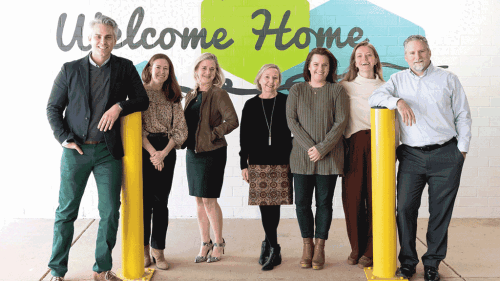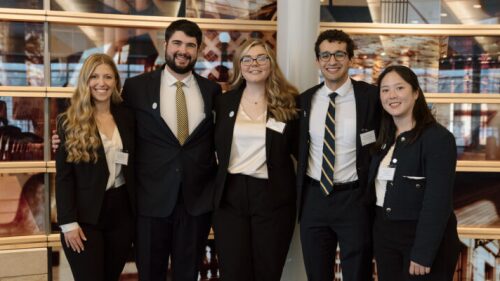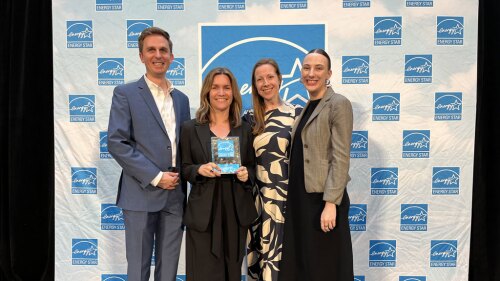Speaking at this year’s Pacific Cities Sustainability Initiative Annual Forum in Beijing, former Australian Prime Minister Kevin Rudd said that cities have the ability to address the growing dangers of climate change, which he said is the biggest challenge facing humanity. Rudd added that China and the United States, as the two largest CO2 emitters, must work together for any climate solution to work.
“If the problem of climate change cannot be solved in Beijing, if it cannot be solved in Washington, let me tell you it won’t be solved anywhere else,” said Rudd.
The goal of the forum, presented jointly by the Asia Society and the Urban Land Institute, is to explore and refine the attributes of a healthy, sustainable, and resilient city. The forum seeks to catalyze new innovations and relationships that will lead to positive outcomes for cities throughout the Asia Pacific region and the world.
Urban Land Institute Chairman, Ms. Lynn Thurber and Asia Society, Vice Chairman Emeritus, Mr. John S. Wadsworth welcomed the delegates on Monday’s opening dinner with Mr. Kevin Rudd, Australia’s former Prime Minister, making the keynote speech.
Rudd, who is serving as the inaugural president of the Asia Society Policy Institute, expressed confidence in the innovation, creativity, and determination of the people of both countries in addressing the challenges posed by climate change and sustainable development.
Speaking to the role that cities can play in addressing climate change, Rudd noted that more than half of the world’s population lives in cities, and that cities generate a huge amount of greenhouse gas emissions. Rudd also said that national governments have an important role.
“The first thing governments can do, at the national level, is put a price on carbon,” he said. “My observation of human behavior is that behavior changes in response to either (A) price or (B) a regulation, which is enforced.”
The advantage of putting a price on carbon instead of using regulations, according to Rudd, is that “it creates a market mechanism through which firms and emitters, across the world, can respond flexibly according to the price that’s been set.” The responses can include reducing energy use or switching to alternative energy sources to improve overall energy efficiency. “It is remarkable, when you look around the world, how energy inefficient we still are,” said Rudd.
Pricing measures become effective when you involve the maximum number of producers responsible for the maximum amount of emissions and impose a price on them, allowing them to pass the price through the economy. The political question is how widely you cover the economy, said Rudd. In terms of emissions, manufacturing, energy, and transport cover about 80 percent of the economy.
Rudd emphasized that energy efficiency measures take effect only in response to price. “If the price of energy is subsidized, people will not be induced into embracing the energy efficiency measures they need.”
On the supply side, Rudd said we need to cause the renewable-energy sector to have sufficient critical mass that can begin to take over a large part of the global demand for electricity.
“Unless we are firmly focused on what happens on the supply side and the demand side, all the proclamations in the world won’t produce a reduced greenhouse gas footprint,” said Rudd.
He said that absent a binding global treaty on emissions, cities must take the lead in action in this area. “There is a concentration of sheer intellectual horsepower, of markets, of finance, of the ability to make climate change solutions work on the ground.”
But according to Rudd, whatever is done in cities can be only part of the solution. National governments must be brought into the equation as well. “Unless that happens, you will simply pass the ball down to the next generation, and the next, until it is too late,” he said.
In addition to finding best practices in terms of policy, planning, and execution, Rudd said it is essential to establish best practices in securing financing. “Unless we are securing financing to make effective these measures, in terms of sustainable use of energy, in terms of sustainable use of water, and other critical inputs in our urban centers around the world, we’re not serious,” said Rudd.
People have generally looked to governments for financing of sustainability projects, but Rudd said there is a limit to what governments can do. “The creative challenge for the future of our cities, and for climate change within our cities, is to use public and private capital in the most creative ways to bring about sustainable solutions,” said Rudd. Private capital, public capital, and public policy must work together to address the global challenge of climate change.
“We’re all in one boat,” said Rudd. “It’s called Planet Earth. If we work together on pricing, on energy efficiency technologies, and [on] alternative-energy supply, then frankly we can save the planet.”
Jointly organized by the Urban Land Institute and Asia Society, this year’s PCSI Forum was titled “Healthy City | Resilient City,” and centered around determining what essential design and building principles are required for healthy, sustainable and resilient urban spaces. Cross-sector experts gathered from around the globe to attend the forum, representing the top minds in architecture, urban planning, urban development, public policy, public health, and the non-profit sector.
With sponsorships from AECOM, Energy Foundation, Chongbang Group, ARUP, Jerde, LendLease, Shui On Land, SOM, Tishman Speyer, and more, the conference featured four mobile workshops, opening dinner, nine plenary panel discussions on social capital, smart cities, public sector innovation, land use patterns, and public health, two roundtable discussions on creating principles for healthy and resilient cities, and networking opportunities for delegates.






